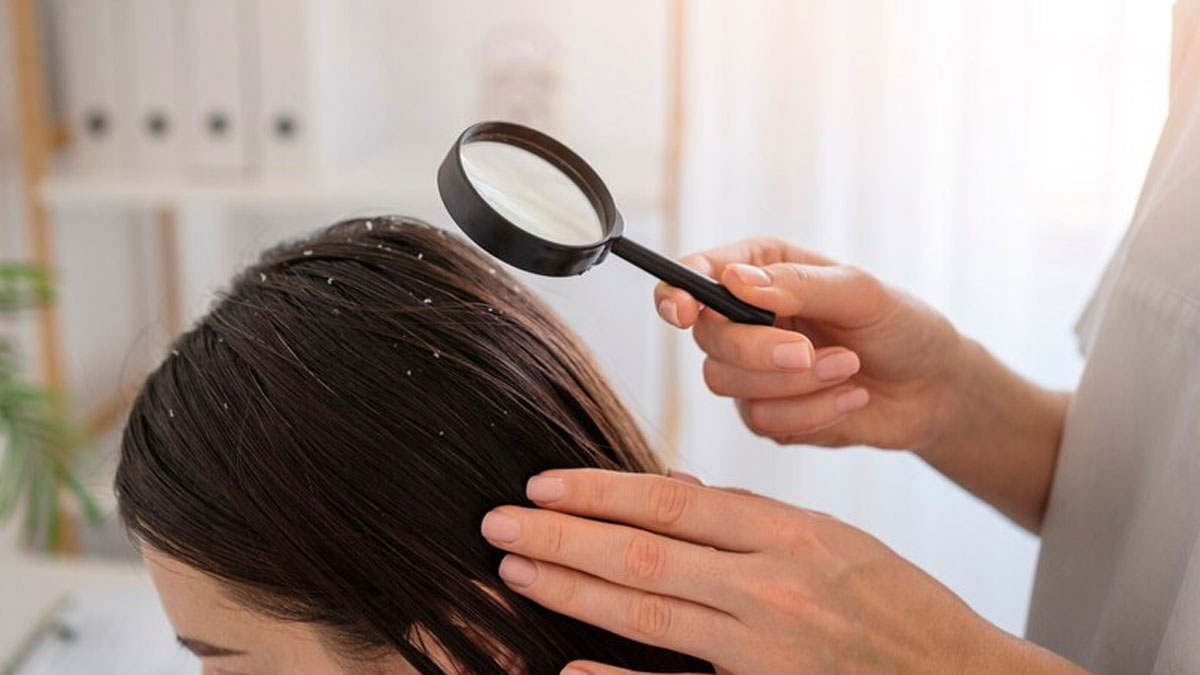
The scalp is prone to various conditions that can cause flaking, itching, and discomfort. Two of the most common issues are scalp psoriasis and dandruff. While both conditions may seem similar due to their shared symptom of flaky skin, they are fundamentally different in their causes, symptoms, and treatment methods.
Table of Content:-
It is important to learn the differences between the two for proper diagnosis and effective management, especially in a country where climatic conditions play significant roles in the prevalence and management of these conditions. We spoke to our expert Dr Sowmya Dogiparthi, MBBS, MD(DERMATOLOGY), FAM (Cosmetology), Apollo Spectra Hospital, Chennai, who explained these conditions and listed their key differences.
What is Scalp Psoriasis?

“It is a chronic autoimmune disorder that causes a rapid accumulation of skin cells. This buildup causes thick, red, scaly patches that can be itchy or even painful,” said Dr Dogiparthi. Scalp psoriasis can range from mild to severe and may extend beyond the hairline to the forehead, back of the neck, and ears. A 2021 study found that psoriasis most commonly affects the scalp, with around 80% of cases involving this area.
What is Dandruff?

It is a common scalp ailment identified by itching and flaking. It is commonly caused by seborrheic dermatitis or an overgrowth of a yeast-like fungus called Malassezia. Unlike psoriasis, dandruff is generally easier to manage and does not involve an autoimmune response. It can happen when the air is dry, frequently washing hair, or if you have skin issues like eczema.
According to a 2010 study, dandruff is a prevalent scalp disorder that affects nearly half of the population before puberty, regardless of gender or ethnicity.
Also Read: Dry Scalp Vs Dandruff: Experts Explains How To Differentiate Between The Two
Differences Between Scalp Psoriasis and Dandruff
.jpg)
Despite their similarities, scalp psoriasis and dandruff have some important differences. Dr Dogiparthi shares some of them as follows:
Appearance
- Scalp Psoriasis: “In darker skin tones, scalp psoriasis appears as violet or brown raised plaques with dry, silvery scales, while in fairer skin tones, it manifests as pink or red raised plaques with dry, white scales. Severe cases can lead to temporary hair loss,” said Dr Dogiparthi.
- Dandruff: It appears as white or yellow flakes on the scalp, which can look greasy and cause the hair to appear oily, especially if accompanied by seborrheic dermatitis.
Location
- Scalp Psoriasis: It is primarily located on the scalp but can extend to the hairline and nearby skin, with other common areas affected, including the elbows, knees, and lower back.
- Dandruff: Primarily affecting the scalp, dandruff can also involve the eyebrows and facial hair in some individuals.
Symptoms
- Scalp Psoriasis: It is characterised by intense itching, flaking, and sometimes burning or pain, with scratching leading to bleeding, further inflammation, and infection. Additionally, nail changes and joint pain are commonly associated with scalp psoriasis.
- Dandruff: Symptoms include mild itching and flaking of the scalp, but unlike scalp psoriasis, dandruff typically does not cause significant pain or bleeding.
Severity
- Scalp Psoriasis: In some individuals, scalp psoriasis may be part of a more severe form known as seborrheic dermatitis, which involves thicker flakes and more extensive skin involvement.
- Dandruff: Some people with dandruff may experience a more severe form called seborrheic dermatitis, characterised by thicker flakes and more widespread scalp involvement.
Also Read: Can Oiling Your Hair Reduce Dandruff: Expert Explains If Its A Myth or Fact
Treatment Options

Here is how you can treat these conditions, as listed by the expert:
- Scalp Psoriasis: For treating scalp psoriasis, medicated shampoos with coal tar, salicylic acid, or ketoconazole help reduce scaling and inflammation. Also, topical treatments like steroid creams and vitamin D analogues are commonly used. Severe cases may require systemic treatments, such as biologics.
- Dandruff: For dandruff issues, anti-dandruff shampoos containing zinc pyrithione, selenium sulphide, or ketoconazole are effective. Natural remedies like tea tree oil and lifestyle changes, such as regular shampooing, are also beneficial in managing symptoms.
Bottomline
Dr Dogiparthi concluded, “While both scalp psoriasis and dandruff cause flaking and itching, they are distinct conditions with different causes and treatments. Proper diagnosis by a healthcare professional is crucial for effective management. Understanding these differences can lead to better care, treatment and improved quality of life for those affected by these common conditions.”
[Disclaimer: This article contains information provided by an expert and is for informational purposes only. Hence, we advise you to consult your own professional if you are dealing with any health issues to avoid complications.]
Also watch this video
How we keep this article up to date:
We work with experts and keep a close eye on the latest in health and wellness. Whenever there is a new research or helpful information, we update our articles with accurate and useful advice.
Current Version